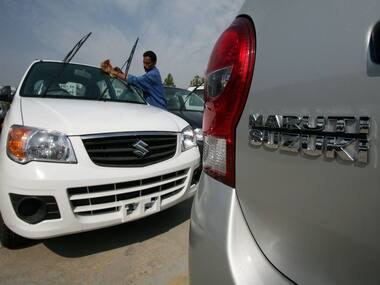Nothing like the whiff of future taxes to get sales flying. That’s the story of diesel cars in February. Car buyers have sensed that the next budget may hit diesel cars with additional taxes and thus rushed to buy in February.
The buzz is that the government is considering an additional tax of Rs 80,000 on diesel vehicles from April, and this explains part of the stampede to buy.
Maruti Suzuki India, which sells every second car in the country, saw growth only in diesel cars last month. It’s bread-and-butter small cars lagged massively. The diesel rush also ensured that Maruti logged its second highest overall domestic sales in history at 1.076 lakh units in February, when overall market sentiment remained sluggish!
[caption id=“attachment_231888” align=“alignleft” width=“380” caption=“Reuters”]
 [/caption]
[/caption]
Combined sales of the Swift, Estilo and Ritz surged 31 percent to 27,899 units (21,287 units); Dzire grew by more than half to 15,068 units (9,490) units.
Hyundai Motor India sold 3,000 units each of the Verna and i20 diesel variants last month. In fact, deliveries of the Verna diesel are waitlisted for seven to eight months, while the waiting period for the diesel i20 is about four months.
The rush for diesel cars is so big this year that four out of every 10 cars being booked is in this category. Demand for petrol cars is declining in relative terms.
The rapid dieselisation of the auto industry has been prompted by the significant difference - around Rs 25 a litre - between petrol and diesel prices. In Delhi, petrol costs Rs 65.64 a litre while diesel costs just Rs 40.91. In Mumbai, petrol is even costlier at Rs 70.65 a litre, while diesel goes for Rs 45.99.
Impact Shorts
More ShortsMoreover, diesel is even more fuel-efficient for users who travel long, suburban distances of 20-30 km daily. A diesel engine may be heavier than a comparable petrol engine but offers more power, 25-30 percent better mileage and an equivalent reduction in carbon dioxide levels. But to fund diesel technology and the usage of more metal in these engines, car makers charge more upfront than they would for a comparable petrol engine.
However, the huge gap between diesel and petrol comes as an added incentive to buy a diesel vehicle - which has policy-makers and environmentalists seeing red.
Late last year, economist Kirit Parekh came out with a report where he estimated that 15 percent of annual diesel use in India was by diesel car owners. Though this data, based on the Petroleum Planning and Analysis Cell’s findings, has been refuted both by the auto industry and the Planning Commission, Parekh has not withdrawn his report and his recommendations could well form the basis for the Finance Minister to consider an additional levy on diesel vehicles in the forthcoming budget.
Parekh’s findings have been supported by the Centre for Science and Environment (CSE) which alleges that carmakers are fudging figures to show that diesel use in cars is minimal.
Rattled by Parekh’s findings, the Society of Indian Automobile Manufacturers (SIAM), the industry’s lobbying arm, did its own study to determine how many diesel cars are running on Indian roads at present and what is their share in overall diesel usage.
Its findings are in stark contrast to Parekh’s. SIAM says diesel cars account for only 1.03 percent of total diesel consumed in the country in a year - and the Planning Commission has further reduced this figure to arrive at 0.6 percent. In any case, the two independent studies have proved that diesel cars (along with taxis) do not account for more than 2 percent of diesel usage in any year.
But CSE’s Anumita RoyChawdhury says cheap diesel is pushing the car market towards bigger cars that guzzle more fuel. While only 13 percent of petrol cars have an engine size of more than 1,200 cc, about 40 percent of diesel cars sold are above 1,500 cc. In 2011-12 till January, cars above 2,000 cc - which include SUVs - registered 41 percent growth rate in sales, she adds.
This explains why critics say it is the rich who benefit from diesel subsidies.
SIAM has rubbished these claims, saying if the Government went ahead with taxing diesel vehicles, the industry will seriously slow down. Already, 2011-12 is expected to close with a lesser number of total vehicles sold than 2010-11. SIAM’s solution to the diesel conundrum is a minimal increase in the price of diesel itself.
“If the government levies Rs 80,000 per diesel vehicle, its estimated additional revenue comes to Rs 5,000 crore (taking the taxi refund scheme into account). But if the price of diesel is raised by Re 1, it will straightaway generate Rs 6,000 crore of additional revenue without stoking inflation,” SIAM Executive Director Vishnu Mathur says.
If the government does impose a tax on diesel vehicles, not just car buyers but even car manufacturers will have to rethink their investments. Maruti Suzuki India is waiting for clarity on diesel vehicles before proceeding to set up a one-lakh-unit engine facility at its Gurgaon plant.
Hyundai Motor India wants to set up its maiden diesel engine facility (it currently imports all diesel engines from South Korea) in India provided the government lays down a clear diesel roadmap. Peugeot Citroen, Tata Motors, Ford and General Motors all want to expand their diesel portfolio provided no additional taxes are levied.
)